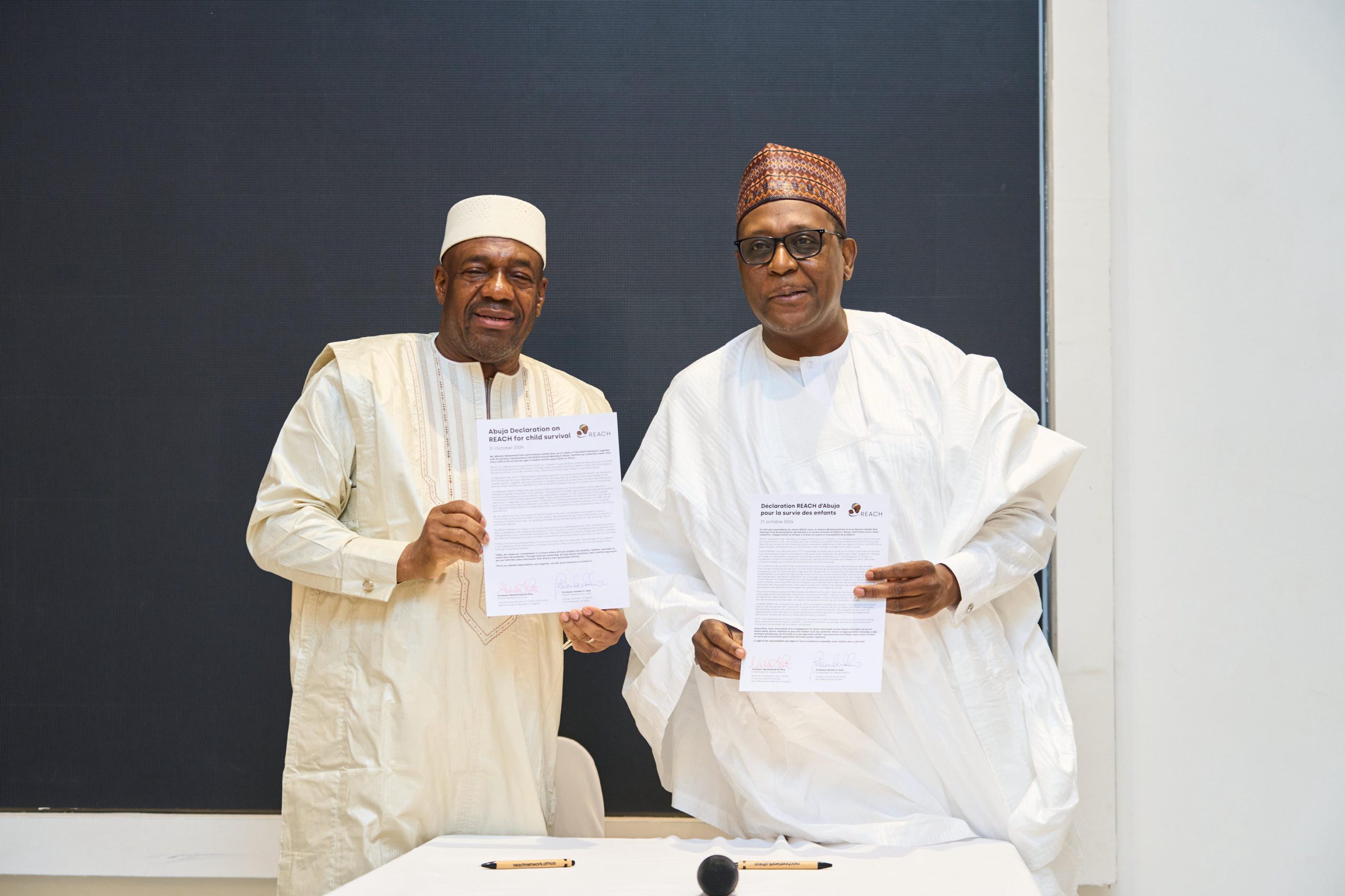
African leaders and global health partners commit to saving children’s lives in Africa
The Co-chairs of the Resiliency through Azithromycin for Children (REACH) Network, Coordinating Minister of Health and Social Welfare of Nigeria, Muhammad Ali Pate and Professor Samba Sow, former Minister of Health of Mali, today formally signed the Abuja Declaration on REACH for child survival, marking a pivotal commitment to reduce child mortality across Africa.
The signing took place at the conclusion of the third annual REACH Regional Network Meeting, held October 29-31, 2024, in Abuja, Nigeria, where representatives from six African nations and global health partners convened to share progress, updates and lessons across REACH studies.
The REACH initiative actively reduces child mortality in Burkina Faso, Côte d’Ivoire, Mali, Niger, Nigeria, and Sierra Leone by administering azithromycin biannually in high-mortality areas. With the Abuja Declaration (full text), the Co-chairs pledge a unified vision of health and opportunity for every child in Africa.
“REACH is built on Africa-led solutions to child health challenges, ensuring our approach is grounded in data, equity, and a commitment to reaching our most vulnerable populations.”

Minister Muhammad Pate
Coordinating Minister of Health and Social Welfare, Federal Republic of Nigeria

A shared vision for Africa
This year’s REACH Annual Meeting included critical discussions on implementation progress and challenges, focusing on equitable drug distribution, cost-effectiveness, and mortality surveillance.
Special emphasis was placed on antimicrobial resistance (AMR), ensuring the balance of immediate child survival benefits with the need to manage resistance for sustainable, long-term impact.

“REACH’s strength lies in evidence-based decision-making and a shared vision across countries. Through this Declaration, we commit to a future where national ownership and collaboration drive our efforts to support Africa’s children.”

Professor Samba Sow
Former Minister of Health of the Republic of Mali

The Abuja Declaration highlights the REACH Network’s commitment to rigorous data collection and AMR monitoring, in alignment with global goals to prevent and manage resistance effectively. As REACH expands, this commitment will reinforce the program’s sustainability and impact for generations to come.
Through national ownership, collaborative frameworks, and an unwavering focus on equitable access, the REACH Network and its partners envision a future where every African child not only survives but thrives.

31 October 2024
Abuja Declaration on REACH for child survival
We, Minister Muhammad Pate and Professor Samba Sow, as Co-chairs of the REACH Network, together with all partners represented at the REACH Annual Meeting in Abuja, reaffirm our collective vision: that every child in Africa has the right to health and the opportunity to thrive.
REACH, or “Resiliency through Azithromycin for Children,” is an initiative aimed at reducing child mortality by distributing biannual azithromycin through mass drug administration (MDA) in high-mortality regions across six African countries—Burkina Faso, Côte d’Ivoire, Mali, Niger, Nigeria, and Sierra Leone.
In alignment with the 77th World Health Assembly resolution on maternal and child health, we recognize that achieving this vision requires a unified, Africa-led approach grounded in the unique needs of our diverse nations. Together, we are committed to forging consensus across the continent and advancing African-driven solutions to address the critical health challenges facing our children and communities.
To implement REACH effectively, we uphold evidence and data as the foundations of our decision-making alongside compassion and solidarity. This approach includes rigorous monitoring and evaluation to ensure transparency, accountability, and adaptability. Integral to this commitment is the vigilant monitoring of antimicrobial resistance (AMR), balancing the benefits of child survival with the risks of resistance. In alignment with the recent United Nations General Assembly declaration on AMR, we will work to incorporate AMR surveillance to protect the sustainability and effectiveness of our program. This approach allows REACH to adapt responsibly, ensuring decisions that safeguard present and future generations.
We recognize that the true impact of REACH is felt in the most vulnerable and hardest-to-reach communities across the continent. For this reason, we are unwavering in our commitment to equity. In the face of limited resources, our guiding principle is to prioritize those most at risk, ensuring that no child is left behind.
The REACH Network is unique in its country-led and country-owned approach. Each participating nation plays a leadership role, shaping the program to fit its specific context, leveraging existing systems and strengthening cross-continental collaboration. This commitment to national ownership within a shared, pan-African framework ensures a resilient network that enhances health outcomes across our continent.
Finally, maintaining and expanding this network across Africa is essential. The strength of our network is our collective voice and impact; it enables innovation, resource-sharing, and mutual support that transcend individual borders.
Today, we renew our commitment to a future where African children are healthy, resilient, and able to reach their full potential. Through national ownership, African-driven solutions, and a unified approach, we can fulfil this vision and ensure that Africa’s next generation thrives.
This is our shared responsibility, and together, we will work tirelessly to achieve it.
Professor Muhammad Ali Pate
REACH Network Co-chair
Coordinating Minister of Health and Social Welfare,
Federal Republic of Nigeria
Professor Samba O. Sow
REACH Network Co-chair
Former Minister of Health of the Republic of Mali
